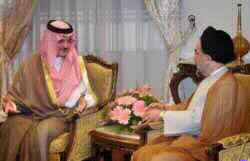The Defense Department in Washington distanced itself Tuesday from a defense think tank recommendation that the United States "target" Saudi oil fields and financial assets if the Arab nation doesn't do more to fight terrorism. The suggestion was made in a briefing to the Defense Policy Board, a group of intellectuals and former senior officials that advises the Pentagon. The government-funded briefing was produced by Laurent Murawiec, a Rand Corp. analyst and former adviser to the French Defense Ministry.
The Pentagon said in a statement that the presentation does not "reflect the official view of the Defense Department."
"Saudi Arabia is a long-standing friend and ally of the United States," the statement said. "The Saudis cooperate fully in the global war on terrorism and have the department's and administration's deep appreciation."
But the briefing represents the opposite view of Saudi cooperation - one that is increasingly being embraced on the staff of Vice President Dick Cheney, among Pentagon civilian leadership and elsewhere in the Bush administration, The Washington Post reported in Tuesday editions.
"The Saudis are active at every level of the terror chain, from planners to financiers, from cadre to foot-soldier, from ideologist to cheerleader," the newspaper quoted the briefing as saying.
Fifteen of the 19 terrorist hijackers on Sept. 11 were Saudi, officials have said. And though the Pentagon has declined to identify the 598 terror suspects jailed at its military prison in Cuba, other sources estimate 100 of them are Saudi, the largest, or one of the largest groups.
"Saudi Arabia supports our enemies and attacks our allies," the briefing said, describing Saudi Arabia as "the kernel of evil, the prime mover, the most dangerous opponent" in the Middle East.
If Saudis refused to comply, the briefing continued, Saudi oil fields and overseas financial assets should be "targeted," although exactly how was not specified.
PHOTO CAPTION
Saudi Arabian Foreign Minister Prince Saud al-Faisal(L) meets with Iranian President Mohammad Khatami in Tehran, August 3, 2002. A briefing last month for a top Pentagon advisory panel depicted longtime U.S. Gulf ally Saudi Arabia as an emerging enemy and backer of terrorism. Sources confirmed on August 6 a Washington Post report that an analyst from the independent Rand Corporation urged the U.S. to press Riyadh to stop funding fundamentalist Islamic outlets and halt anti-U.S. and anti-Israeli statements in the kingdom. Photo by Raheb/Reute
- Author:
& News Agencies - Section:
WORLD HEADLINES


 Home
Home Discover Islam
Discover Islam Quran Recitations
Quran Recitations Lectures
Lectures
 Fatwa
Fatwa Articles
Articles Fiqh
Fiqh E-Books
E-Books Boys & Girls
Boys & Girls  Hajj Rulings
Hajj Rulings Hajj Fatwas
Hajj Fatwas














